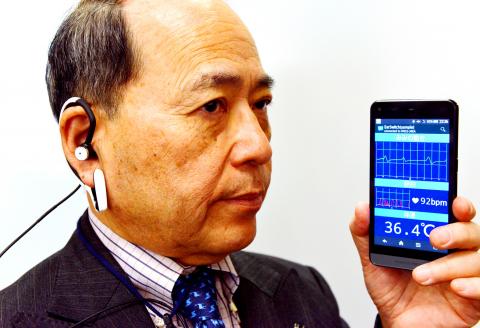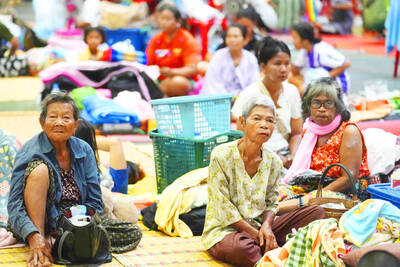A tiny personal computer that is worn on the ear and can be controlled with the blink of an eye or the click of a tongue is being tested in Japan.
The 17g wireless device has bluetooth capability and is equipped with GPS, compass, gyro-sensor, battery, barometer, speaker and microphone. Wearable computing is thought by many commentators to be the next big thing in technology, with products such as Google Glass at the forefront.
The device, known at the moment as the “Earclip-type Wearable PC” has a microchip and data storage, enabling users to load software, engineer Kazuhiro Taniguchi of Hiroshima City University said.

Photo: AFP
Its designs are based on traditional flower arrangements.
“We have made this with the basic idea that people will wear it in the same way they wear earrings,” Taniguchi told reporters in a recent interview as he showcased a black prototype.
The system, which developers are hoping to have ready for Christmas next year, can be connected to an iPod or other gadget and would allow the user to navigate through software programs using facial expressions, such as a raised eyebrow, a stuck-out tongue, a wiggle of the nose or by clenching teeth.
The device uses infrared sensors that monitor tiny movements inside the ear, which differ depending on how the eyes and mouth move.
Because the user does not have to move either hand, its developers say it can serve as “a third hand” for everyone from caregivers and rock-climbers to motorbike riders and astronauts, as well as people with disabilities.
“Supposing I climb a mountain, look at the sky at night and see a bright star up there, it could tell me what it is,” Taniguchi said. “As it knows what altitude I’m at, which direction I’m looking and at what angle, it could tell me: ‘The bright star you are seeing now is Sirius.’”
Using a smartphone to connect to the Internet would mean you could be automatically put in touch with people in faraway places who are doing the same thing as you.
“This could connect you with a person who is looking at the same star at a remote place at the same time,” enabling the people to swap impressions, Taniguchi said.
A second version of the device might be pressed into use to help relatives keep an eye on elderly family in graying Japan.
The earpiece, which could also function as a hearing aid, could monitor the wearer’s health, including their pulse and body temperature, while logging how often they eat and sneeze, offering early warning of the onset of illness.
An onboard accelerometer could tell when the user falls and instruct the smartphone to pass information to relatives, or call an ambulance based on GPS data.

FOREST SITE: A rescue helicopter spotted the burning fuselage of the plane in a forested area, with rescue personnel saying they saw no evidence of survivors A passenger plane carrying nearly 50 people crashed yesterday in a remote spot in Russia’s far eastern region of Amur, with no immediate signs of survivors, authorities said. The aircraft, a twin-propeller Antonov-24 operated by Angara Airlines, was headed to the town of Tynda from the city of Blagoveshchensk when it disappeared from radar at about 1pm. A rescue helicopter later spotted the burning fuselage of the plane on a forested mountain slope about 16km from Tynda. Videos published by Russian investigators showed what appeared to be columns of smoke billowing from the wreckage of the plane in a dense, forested area. Rescuers in

Philippine President Ferdinand Marcos Jr is to meet US President Donald Trump this week, hoping Manila’s status as a key Asian ally would secure a more favorable trade deal before the deadline on Friday next week. Marcos would be the first Southeast Asian leader to meet Trump in his second term. Trump has already struck trade deals with two of Manila’s regional partners, Vietnam and Indonesia, driving tough bargains in trade talks even with close allies that Washington needs to keep onside in its strategic rivalry with China. “I expect our discussions to focus on security and defense, of course, but also

POINTING FINGERS: The two countries have accused each other of firing first, with Bangkok accusing Phnom Penh of targeting civilian infrastructure, including a hospital Thai acting Prime Minister Phumtham Wechayachai yesterday warned that cross-border clashes with Cambodia that have uprooted more than 130,000 people “could develop into war,” as the countries traded deadly strikes for a second day. A long-running border dispute erupted into intense fighting with jets, artillery, tanks and ground troops on Thursday, and the UN Security Council was set to hold an emergency meeting on the crisis yesterday. A steady thump of artillery strikes could be heard from the Cambodian side of the border, where the province of Oddar Meanchey reported that one civilian — a 70-year-old man — had been killed and

‘OPPORTUNITY TO ENGAGE’: Antonio Costa and Ursula von der Leyen are to meet Chinese President Xi Jinping to discuss EU-China relations and geopolitical challenges Top leaders from China and the EU are to hold a summit in Beijing this week, as the major economic powers seek to smooth over disputes ranging from trade to the Ukraine conflict. Beijing and Brussels have been gearing up to mark the 50th anniversary of the establishment of diplomatic ties, but a suite of squabbles over state subsidies, market access and wartime sanctions have dampened the festivities. A spokesperson for the Chinese Ministry of Foreign Affairs yesterday confirmed that European Council President Antonio Costa and European Commission President Ursula von der Leyen would visit on Thursday. The statement came after the EU